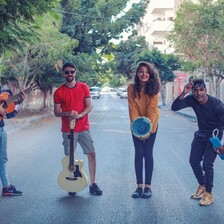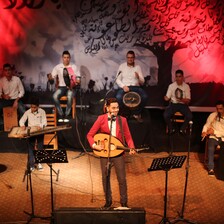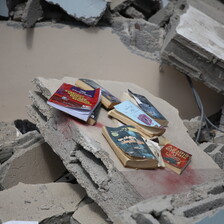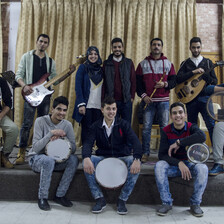The Electronic Intifada 10 October 2018
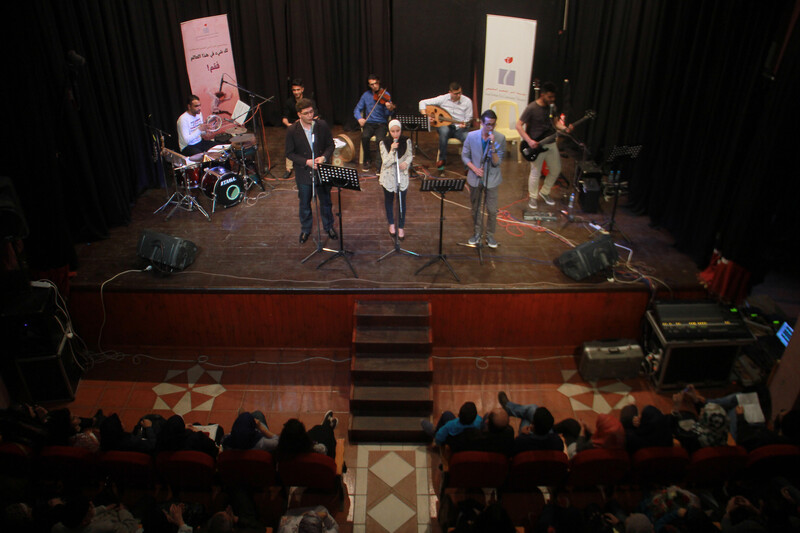
The Nessan Band performing at the Said al-Mishal Cultural Center in 2015. (Tamer Institute for Community Education)
I clearly remember the first time I learned about the Said al-Mishal Cultural Center.
“Haven’t you seen it yet?” asked Muhammad, a boy older than me. “It’s the most beautiful stage in Gaza. It has a shiny wooden floor with fancy red chairs. When the curtains open, the audience goes completely silent.”
The conversation took place in 2008. Muhammad and I both played oud. We were taking lessons at a summer camp run by UNRWA, the UN agency for Palestine refugees.
I had a goal that summer: to perform at the camp’s graduation ceremony. It was scheduled to take place in the cultural center.
Unfortunately my goal wasn’t realized. The coordinators of the UNRWA camp chose some musicians who had more experience than I did to play at the Gaza City ceremony.
Despite my disappointment, I was excited to attend the ceremony as it meant I could visit the cultural center. As the curtains opened at the start of the concert, I could feel my heartbeat getting faster.
Six years later, I formed the Nessan Band with some friends. I insisted that we play our first show at the Said al-Mishal Cultural Center.
This time, I saw the curtain opening from the inside. My heart pounded rapidly once again.
Freedom and hope
I know that many others feel the same way about the cultural center as I do. It is no exaggeration to describe it as a second home for dancers, musicians, poets and painters.
We were all given a freedom there to express ourselves and be creative. We did not have that same freedom anywhere else in Gaza.
I don’t think it is an exaggeration either to say that the center brought our people some sorely needed hope.
Being able to see a play or a concert was a necessary break from the routine of living in Gaza, an open-air prison. It gave the audience a chance to imagine a better life.
The center provided numerous benefits to Gaza’s inhabitants. Most people I know had attended an event there.
Ahmed al-Najjar, a university student in Gaza, encapsulated the sense of loss we all felt when hearing that the cultural center had been destroyed by Israel on 9 August.
“Every one of us has a memory there,” he said. “All the concerts, plays and exhibitions that I saw in my life were held at al-Mishal. This is the difficult part of losing it. It’s collective punishment. All of those rare joyful moments of our lives have been removed. All of them have gone because of an airstrike.”
Attempt to erase memory
The late intellectual Edward Said argued back in 2002 that Israel was destroying “the civil existence of the Palestinian people with impunity.”
Said referred to the attacks ordered by Ariel Sharon, then Israel’s prime minister, on the Palestinian Central Bureau of Statistics and the way records had been stolen from other public bodies. Sharon, he wrote, was trying to “eliminate” Palestinians as “a people with national institutions.”
The Said al-Mishal Center was a vital institution for Gaza’s people.
My friend Mohamed Jabaly began teaching dabke – a traditional Palestinian dance – at the center in 2008.
For him, Israel’s attack was “a direct attempt to erase our positive and happy memories.”
Mohamed is the director of Ambulance, a film about what medical workers experienced during Israel’s 2014 attack on Gaza.
Last year, the film was shown at a festival held in the Said al-Mishal Cultural Center. Mohamed now lives in Norway. Being unable to attend the Gaza screening was “one of the most difficult moments of my life,” he said.
“Now we are talking about al-Mishal and all our memories inside that place in the past tense,” he added. “The occupation isn’t just controlling our lives and future. It’s also trying to remove our cultural legacy. In my opinion, that is more dangerous.”
“Life worth living”
Palestinians from Gaza living in exile – like me – closely follow the news from home. We do so not just because we still have family and friends in Gaza but because the place shaped us. The experiences we had growing up made us into the people we are today.
I was deeply shocked when I heard that the Said al-Mishal center had been bombed. I could not understand why a place that was so important to me had been destroyed.
Then a friend showed me some lines from a poem by Mahmoud Darwish:
We have on this land that which makes life worth living
We have on this land all of that which makes life worth living
April’s hesitation
The aroma of bread at dawn
A woman’s beseeching of men
The writings of Aeschylus
Love’s beginning
Moss on a stone
Mothers standing on a flute’s thread
And the invaders’ fear of memories
We have on this land that which makes life worth living
These lines made me realize that Israel fears our memories. Our memories are a source of inspiration and motivation to us.
They help us to resist. They make life worth living.
Mousa Tawfiq is a journalist formerly based in Gaza, now living in Paris.

